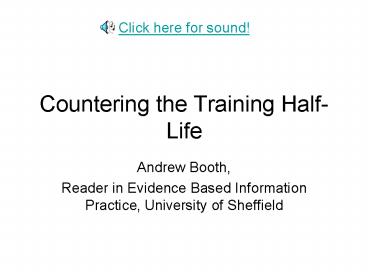Click here for sound! Countering the Training Half-Life - PowerPoint PPT Presentation
Title:
Click here for sound! Countering the Training Half-Life
Description:
Click here for sound! Countering the Training Half-Life Andrew Booth, Reader in Evidence Based Information Practice, University of Sheffield Click here for sound! – PowerPoint PPT presentation
Number of Views:155
Avg rating:3.0/5.0
Title: Click here for sound! Countering the Training Half-Life
1
Click here for sound! Countering the Training
Half-Life
- Andrew Booth,
- Reader in Evidence Based Information Practice,
University of Sheffield
2
Click here for sound!The Training Half-life?
- How long after a training session have our
trainees forgotten half of what we have told them
and how much longer to lose the other half? - ... at the very moment when a learning period is
finished, the brain has not had enough time to
integrate the new information it has
assimilatedIt needs a few minutes to complete
and link firmly all the interconnections within
the new material to let it 'sink in'. - The decline that takes place after the small rise
is a steep one within 24 hours of a one-hour
learning period at least 80 per cent of detailed
information is lost. - (Buzan, 2005)
3
Click here for sound!We all know what he means!
- Lecture process by which the notes of a teacher
become the notes of a student without passing
through the minds of either Michael ODonnell
4
Click here for sound!Partial Learning
- While teachers are lecturing, students are not
attending to what is being said 40 of the time
5
Click here for sound!Partial Recall
- In the first 10 minutes of lecture, students
retain 70 of the information in the last ten
minutes, 20
6
Click here for sound!Partial interest
- Students lose their initial interest, and
attention levels continue to drop, as a lecture
proceeds
7
Click here for sound!Partial education
- Four months after taking an introductory course,
students knew only 8 more than a control group
who had never taken the course
8
Click here for sound!One size does not fit all
- Training courses are designed around an average
user (the one with 2.4 children!) - At any point in time almost half our users are
getting more than they want and the other
(almost) half are getting stuff they already know - They either decide what they need (and they are
notorious for not being able to self-assess their
competency e.g. beginners, intermediate,
advanced) OR we decide what is best for them
9
Click here for sound!What do we typically
evaluate?
- Was this training session a pleasurable
experience for you? - ? ? ?
- We know this because they usually mention the
biscuits! Or the heat of the room! - Compared with.? Blood, faeces, urine,
gangrene, death?
10
Click here for sound!Evaluation bypass
- We interpret mentions of the biscuits or the heat
of the room as at least this means that there
is nothing else more important to worry about
(false positives). - Whereas it could mean that this is what they
consider a successful outcome from the session
OR - That we have designed a good instrument for
assessing their physical comfort!
11
Click here for sound!Not having information
skills training can be..
- good because you have to learn the hard way.
You tend to have better skills if you have had to
find your own way around - but it would've been
nice to have been eased into it, in a bit more
structured way as well - Goodall, D. L. and P. Brophy (1997). A comparable
experience? library support for franchised
courses in higher education. British Library
Research and Innovation Report 33. Preston,
CERLIM, University of Central Lancashire viii,
233p.
12
Click here for sound!Solutions?
- We need to encourage effective note-taking
- We need to stimulate mnemonic techniques
- We need to promote review, repetition and
reinforcement - We need to enhance interaction
- We need to use problem-based learning scenarios
13
Click here for sound!Further Reading
- To receive a copy of the article on which this
presentation is based send an email with the text
GET FOLIO\half.pdf to jiscmail_at_jiscmail.ac.uk
With no Subject line, no signature file - Also see "Remember the Gin and Tonic!" Using
Alcohol to Teach Boolean Searching - http//www3.baylor.edu/LIRT/lirtnews/1995/jgin.htm
l
















![What is bug life cycle?[In-Depth]|Bytes Online Training PowerPoint PPT Presentation](https://s3.amazonaws.com/images.powershow.com/8975340.th0.jpg?_=20180104109)
![What is the bug life cycle?[In-Depth]|Bytes online training PowerPoint PPT Presentation](https://s3.amazonaws.com/images.powershow.com/8975351.th0.jpg?_=201801041010)

![What is bug life cycle?[In-depth]|Bytes online training (1) PowerPoint PPT Presentation](https://s3.amazonaws.com/images.powershow.com/8975345.th0.jpg?_=201801041010)











